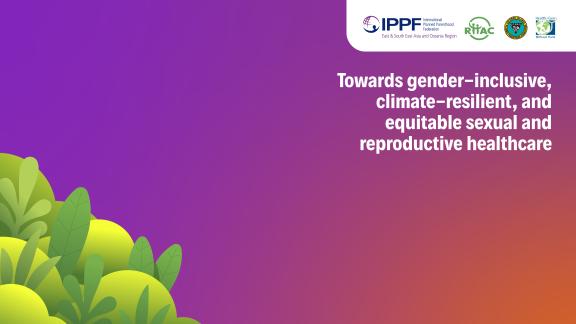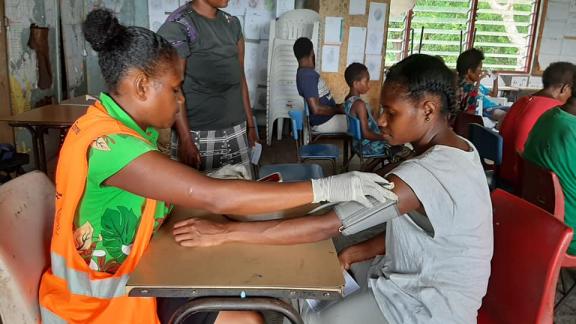On 23 March 2022, Health Care Without Harm Southeast Asia (HWCH SEA) and the International Planned Parenthood Federation East and Southeast Asia and Oceania Region (IPPF ESEAOR) hosted a webinar to promote a gender-sensitive and climate-resilient agenda for women’s and girls’ sexual and reproductive health (SRH) across South East Asia and the Pacific.
Impact of Climate Change on Women and Girls in all their Diversities
The latest report from the Intergovernmental Panel on Climate Change (IPCC) noted that rising temperatures and extreme weather events will significantly affect SRH care such as maternal and child health, worsening existing challenges and inequalities faced by vulnerable communities, especially women and girls.
In her opening remarks, Tomoko Fukuda, Regional Director, IPPF ESEAOR, highlighted the impacts of climate change in South East Asia, “…Not only is access (to sexual and reproductive health and rights (SRHR)) affected, but we see an increase in gender-based violence. (Climate-related inequalities) serves to increase the displacement of people… to be in more harm when a humanitarian crisis happens.”
Athena Galao from UN Women Asia Pacific said, “The climate crisis will have a detrimental impact on women, children and other underrepresented communities.” It is more important to recognize how climate change threatens human rights, especially sexual health and reproductive rights.
Climate change does not affect us all equally. While we all may be in the same storm, we are not in the same boat.
What is our response?
Manjit Sohal, HCWH SEA talked about the ongoing joint project advancing health and gender equity by building climate-resilient and sustainable health facilities in communities in Cambodia and Solomon Islands in partnership with IPPF members. She explained, “Our overall goal is to reduce health and gender inequities and address climate justice.” Thus, by conducting a baseline assessment of their carbon footprint, they will be able to develop a plan of action to reduce their emissions & decarbonize.
Our Member Associations, Reproductive Health Association of Cambodia (RHAC) and Solomon Islands Planned Parenthood Association (SIPPA) shared their experiences and expectations of the joint project.
Dr Var Chivorn, RHAC’s Executive Director, shared Cambodia’s existing policy strategies and limited budget allocation to climate change. RHAC is working on the ground to research and develop advocacy toolkits to push the government to adopt a gender transformative approach to climate policies. He added, “The most notable point (from the study) is the limited understanding about health care during pregnancy which leads them (women and girls) to not consider the basic needs of health service during these disasters.”
The Solomon Islands are one of the most vulnerable countries to climate change. Ben Angoa, SIPPA’s Executive Director, discussed how the high exposure to natural hazards and extreme weather conditions on the islands affect access to SRH services. In direct response to this, SIPPA is ensuring their preparedness, response, and recovery efforts are set up for climate-related disasters. They are working to integrate SRHR into climate change adaptation and resilience-building by partnering with HCWH SEA and the Ministry of Health to build resilient facilities and empower young people.
SRHR in climate change adaptation and resilience
As a society, we should be worried about the lack of gender-sensitive policies to address the unique impact of climate change on gender equality. We need to adopt a human rights-based approach to develop transformative policies integrating SRHR and climate action. It is critical to build evidence from the existing gender data and invest in SRHR in climate and humanitarian action. We must promote women, girls, and people with diverse sexual orientations, gender identities, gender expressions, and sex characteristics (SOGIESC) leadership in resilience-building.
In his closing remarks, Ramon San Pascual, the Executive Director of HCWH SEA called for action. He said, “When we talk about taking care of SRHR in the context of the climate crisis, we are talking about two (2) communities:
Regular communities, where we live… and the health facilities surrounding them, as well as the whole issue of gender inequity in the healthcare sector.” He urged stakeholders to create impactful action to build climate resilience and strengthen communities that are at the forefront.
when









